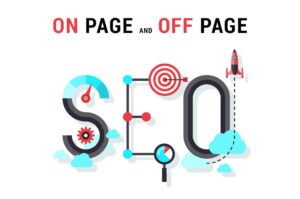On-Page and Off-Page SEO: Which One Is Better For 2025?

If your head is spinning already—don’t worry—the cavalry is on the way!
Search Engine Optimization (SEO) can feel like learning a second language, but once you understand the difference between On-Page SEO and Off-Page SEO, things get a lot clearer—and your website rankings can soar.
Let’s break down these two essential components of a successful SEO strategy.
What Is the Difference Between On-Page SEO and Off-Page SEO?
The names say it all:
On-Page SEO refers to optimizing elements within your website to improve your visibility in search engines.
Off-Page SEO involves activities outside your website that influence your position in search engine results, like backlink building, brand mentions, and social media signals.
✅ Both On-Page and Off-Page SEO are critical to increasing organic traffic and improving Google rankings.
On-Page SEO: Key Optimization Elements
To boost your search engine rankings, start with what you can control directly—your website. Here are the top On-Page SEO techniques to implement:
🔍 1. Targeted Keyword Research
Use SEO tools like SEMrush, Ahrefs, or Google Keyword Planner to find high-volume, relevant keywords. Focus on search intent and integrate primary and secondary keywords naturally into your content.
✍️ 2. SEO-Optimized Content
Content is king. Create high-quality, original content that provides value, answers user queries, and includes targeted keywords. Use headers, bullet points, and visuals to improve readability and engagement.
🏷️ 3. Compelling Meta Titles & Descriptions
Write unique, keyword-rich meta titles and meta descriptions for each page. These elements increase click-through rates (CTR) and improve your visibility in the Search Engine Results Pages (SERPs).
🔗 4. Strategic Internal Linking
Use internal links to guide users to related content and strengthen your site architecture. This helps search engines crawl your website more effectively and improves SEO rankings.
🖼️ 5. Image Optimization
Compress images for faster loading, and use descriptive file names and alt text for accessibility and SEO.
📱 6. Mobile-Friendly Design
With mobile-first indexing, responsive design is non-negotiable. Ensure your website looks great and functions well on all devices.
⚙️ 7. Improve Core Web Vitals
Optimize for Google’s Core Web Vitals, including:
Largest Contentful Paint (LCP)
First Input Delay (FID)
Cumulative Layout Shift (CLS)
These factors directly impact your user experience and search rankings.
🔎 8. Use Schema Markup
Add structured data (schema) to help search engines understand your content and enhance your listings with rich snippets.
Off-Page SEO: Boosting Authority and Credibility
Off-Page SEO strengthens your website’s domain authority and reputation. Here’s how to build trust and earn credibility from outside sources:
🔗 1. Earn High-Quality Backlinks
Backlinks from relevant, authoritative websites are still the #1 ranking factor in Google’s algorithm. Focus on earning natural, do-follow backlinks through great content and outreach.
💬 2. Engage on Social Media
Promote your content on platforms like LinkedIn, Twitter/X, Instagram, and Facebook to drive traffic and encourage sharing. Increased engagement leads to more visibility and inbound links.
🗣️ 3. Get Brand Mentions & Citations
Mentions of your brand—even without a link—help improve brand awareness and trust signals in Google’s eyes.
✍️ 4. Guest Posting & Digital PR
Publish guest articles on high-authority websites in your industry. This expands your reach, earns backlinks, and positions you as a thought leader.
📍 5. Google Business Profile Optimization
For local SEO, optimize your Google Business Profile (formerly GMB). Include accurate NAP info (Name, Address, Phone), add photos, collect reviews, and update regularly.
🤝 6. Collaborate with Influencers
Partner with industry influencers and bloggers to tap into their audience and earn referral traffic and backlinks.
On-Page and Off-Page SEO in 2025: Which Matters More?
The answer? Both.
Google’s algorithm in 2025 rewards websites with strong technical foundations and high authority signals. It’s not about choosing one over the other—it’s about building a comprehensive SEO strategy that includes both.
✅ Why On-Page SEO Is Still Critical
Improves content relevance and search intent alignment
Enhances user experience with fast, mobile-friendly design
Provides a foundation for effective indexing and crawling
🔗 Why Off-Page SEO Is Still Powerful
Backlinks are a top-ranking signal
Increases domain authority and trust
Builds your brand’s digital reputation
The Best SEO Strategy for 2025: A Balanced, Hybrid Approach
To succeed in today’s competitive search landscape, focus on the following On-page and Off-Page SEO best practices:
✨ Publish high-quality, keyword-focused content
🔗 Earn authoritative backlinks from relevant sources
⚙️ Optimize your site’s technical performance
📢 Amplify your content through PR, social media, and outreach
Final Thoughts
On-Page SEO builds a strong, optimized foundation. Off-Page SEO earns trust and authority in your niche. You need both On-page and Off-Page SEO.
For sustainable growth and top search engine rankings in 2025 and beyond, invest in a hybrid approach that balances technical SEO, content, and authority-building strategies.
You also like: Retargeting Hacks that actually work
